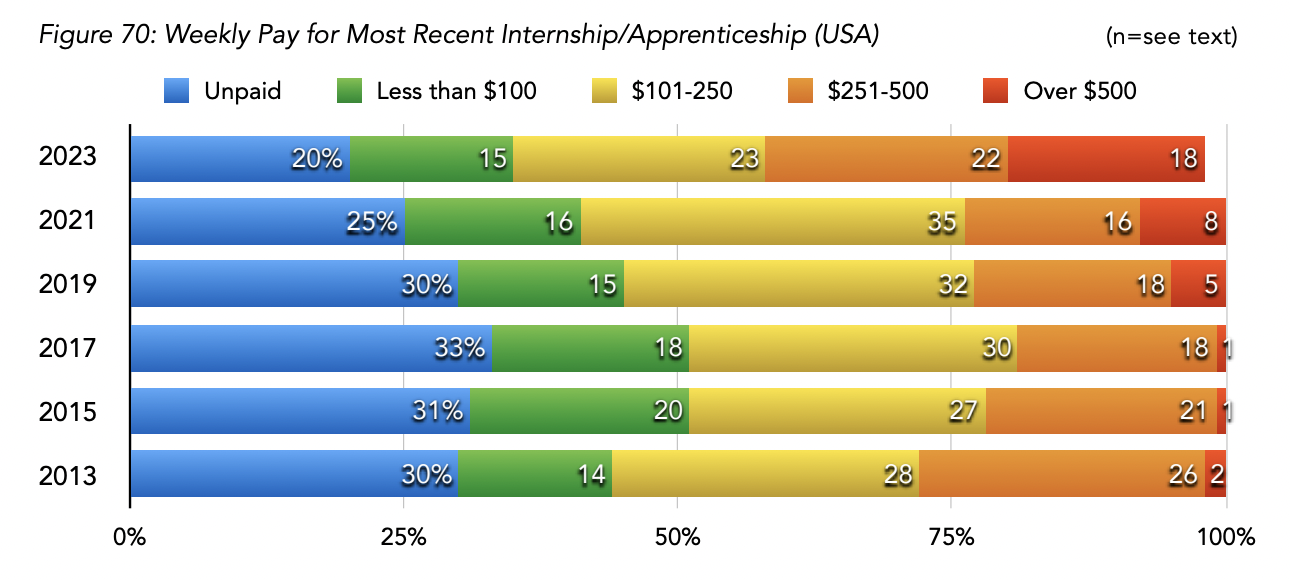
Are You Thinking About a Career in Stage Management? Info from the 2023 Stage Manager Survey | brokeGIRLrich
So I’m a little behind this year, but I thought we could do our bi-annual dig into the Stage Manager Survey Report.
You might be wondering, what is the Stage Manager Survey Report. Run by David J., McGraw, the report has been happening since 2006 in an effort to better share info about the industry with other stage managers.
As a recent graduate in 2006, I can confirm, there was not a huge stage management community at the time. There was the absolutely invaluable SMNetwork.org forum and the SMA, which really didn’t do a lot other than send out a newsletter a few times a year (compared to the SMA now, which still does the newsletter, but also has a lot of great educational resources, shadowing opportunities and additional info on stage managing).
Essentially, if you wanted to know something about stage management, you had your personal community to turn to or the SMNetwork.
Nowadays, we have quite a few places for stage management community, which has been a wonderful thing to watch unfold – in particular The Year of the Stage Manager on Facebook is a fantastic and welcoming resource, along with all sorts of smaller regional groups.
But the Stage Manager Survey still provides us with some really interesting info that isn’t condensed in any sort of easy to access way in any of these other resources.
It’s also current. I believe the survey occurs every other year and, as we’ll see below, shares important stats about jobs, training, income, and areas of improvement in the field.
So let’s get to it – this is just a glimpse at my favorite info from the survey, if you want to read the entire thing or learn more about how it is conducted, you can download a full copy at The Stage Manager Survey website.
—

As someone studying in the UK and considering possibly spending more of my life over here thanks to the handsome British man I happen to love, I was happy to see such a high outcome on career viability in the UK. For my American readers, this question was posed specifically to those outside the US, so I guess we are making the assumption that stage management is a viable career in the US.
I was also happy to see this, because wages in the UK are a lot lower than in the US – in some ways, this is fine, there are more social safety nets and less out of pocket expenses, though the taxes are higher here. I had wondered a bit if people were often sticking it out for a full career in stage management. I am also aware that the UK has a pretty severe skilled worker shortage in the technical arts, so that may also be helping these numbers at the moment.
Ok. On to some other salient information. Are you thinking, should I spend money on a college degree for something like stage management?

It does seem like most people do. MULTI indicates a compilation of all the countries that had a very small number of contributors may not focus on formal education as much. But in the US and UK, my two primary geographical interests, it’s very common to get an undergraduate degree and not uncommon to obtain a graduate degree.
Notably though, education isn’t quite the same as doing the thing and there are a significant number of stage managers also engaging in outside training:
- Shadowing cue calling – 69%
- Shadowing on deck – 63%
- SM Internships – 47%
- Production assistantships – 32%
- Some other sort of internship in the performing arts – 18%
I suspect some of the large number of people getting degrees in the field do so because they open more doors to these sorts of opportunities. As someone who hires sometimes, I believe evidencing those sort of training activities, even without a degree, could be almost as useful to begin a stage management career.
All most of us want is some evidence you know what stage managers do, that you’ve done it yourself a few times before, and that some folks who are also stage managers are willing to give you a reference. Universities kind of package that up neatly for you (at great expense), but as you can see there are alternative routes.
And I’m not hating on education. Clearly. I have a BA in Theatre Arts, an MA in Theatre & Performance Studies, and I’m working on a doctorate right now in the hopes of working in higher education. One of my greatest delights is when I get to teach stage management at a university level. But the expense of higher education, especially in the US, but also increasingly in the UK, is not something to be taken lightly.
And if you already work in the field or have that degree, how do you decide what additional skills to invest in?
I often joke that as a kid I loved reading Hints from Heloise in the newspaper (…lately I say a lot of things that make me feel very old). I just like being prepared. I like knowing skills. I like being competent at things so I can help. And I think this is a very common desire among stage managers. We love to learn new skills that improve how we do our weird and wild jobs.
But training takes time and costs money, so which ones are other stage managers investing in?

I know that over the years I have done training across several of these categories, though if I were just starting out, I would prioritize first aid training (she says sitting on an expired First Aid & CPR certification at the moment), followed by workplace safety (an OSHA-10 or OSHA-30 card can be a plus on job applications, particularly with larger commercial companies).
During the pandemic, I wrote up a collection of potentially useful training for stage managers that you can read here. This list is still good, though the prices are now four years outdated.
Speaking of jobs, I don’t really love writing cover letters, but looking at pages 20-23 on the survey with different responsibilities by position in different countries, it occurred to me that this helps highlight potential skills to emphasize and talk about related to the position you are applying for. So if you’re not sure what examples to reference in your cover letter when you’re applying for an ASM position, and the listing doesn’t give you a clear answer, maybe highlighting the skills with a large portion of red below is a useful path to take.

It also tells me that if you want one of these positions and feel your ability to do the skills they seem to be doing is weak, those are the things to brush up on.
Also important to note is that it’s not uncommon for people at the beginning of the career to need some financial support, which, unfortunately, I suspect feeds into some of the inequality of lower income folks in the field. This is further amplified in what age you come to the career, with the financial support significantly higher for those in the 21-25 year old age range and generally decreasing among those who come to the career later in life.

This could be connected to the average internship and apprenticeship wages, which we can see, in the US, are usually not very good and certainly not a living wage.

It’s also a little alarming that it seems the majority of stage managers who do consider the career financially viable are only supporting themselves. This raises questions about the ability to have a family on this career path, which aren’t exactly new but pretty grim that it’s still a problem.

The next graph has little to with money but is always one of my favorites, indicating that most of us are still making questionable health choices but at least we’re drinking less alcohol, even if our caffeine consumption is a bit excessive.
And to be fair, eating out is a budget killer, for sure, but I am incredibly sympathetic to the many issues that can stand in your way to meal prepping with this career.

And now to the nitty gritty numbers. How is stage management income doing these days?

It’s noteworthy that the graph after this (page 36, if you’re interested), indicates a substantial increase in expenses too though. So what does this translate to in real things you might need over time?

I would also point out that while we’re talking income, the lifestyle of a stage manager, as an independent contractor but also sometimes W-2 worker, made life very difficult for me when I was trying to buy a house even though I had a substantial down payment saved up. So this lifestyle can come with additional challenges besides the obvious ones timed to your salary.
Additionally, how much of your salary is likely to come from stage managing? Do you picture yourself doing it full time or as an occasional thing? Regardless of what you envision, below is a glimpse of how income breaks down for stage managers across several countries. Even with an Equity card, you may, in reality, be a waiter or a substitute teacher who just picks up a few stage management gigs a year.
Though hopefully that’s a temporary step. I would be curious to see how these break down across age ranges or number of years as a stage manager.

And how much are stage managers making this year? In the past, I’ve written about my non-linear income as a stage manager. Even in the past year, I’ve done some low paying gigs and also the highest paying gig I’ve ever done (which did land in 7% on here). Choosing this field requires some really strong personal finance skills to balance the good gigs with the bad ones.

And then, my friends, I’d like to draw your attention to these two graphs. The first is the gender breakdown in stage management. Note that 68% of stage managers in the US identify as female.

And now, let’s look at this pay scale graph:

Isn’t it fascinating how green it gets in the higher pay levels. And isn’t it weird that purple, non-binary, nearly disappears?
Just something to note. Something to think about.
So, still interested in doing this? Here’s where US stage managers look for work. And here is a list I compiled of places you can look for stage management work.

But maybe one of the most important rubrics isn’t a money one, but stage manager’s satisfaction with their career. I think, unsurprisingly, the longer you stage manager, the higher your satisfaction, because you would probably change careers along the way if you don’t love it.

Still interested in stage managing? I have a ton of posts on the subject you can read here and there are some great groups like The Year of the Stage Manager and the SMA that you can connect with to learn more.
Already a stage manage? Make sure you sign up at The Stage Manager Survey website so you can contribute to the 2025 findings!



